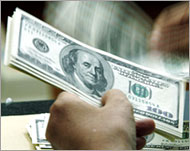Greenspan fears for global economy
Alan Greenspan, the US Federal Reserve chairman, fears that America’s failure to deal with its exploding budget deficit and worldwide efforts to erect trade barriers could disrupt the global economy.

Speaking at an economic conference in London on Friday, Greenspan said the US had so far been able to finance its current account trade deficit, which hit a record $668 billion last year, because of the flexibility of the American economy.
But he said such flexibility would be threatened by rising protectionism, which would increase barriers to the flow of goods and investments across the US border.
He also worried about the harm that could be done if the US and other nations did not get their budget deficits under control.
Greenspan in his prepared remarks, which were released in Washington, said: “If … the pernicious drift toward fiscal instability in the United States and elsewhere is not arrested and is compounded by a protectionist reversal of globalisation, the adjustment process could be quite painful for the world economy.”
Second warning
The London speech represented Greenspan’s second warning.
In an earlier speech, he had said that there could be severe consequences for the US economy if policy-makers did not attack a federal budget deficit that was projected to soar with baby-boomer retirements.
In that taped speech to a conference in Philadelphia, Greenspan said that Congress would probably have to make “significant adjustments” in reducing benefits for future
retirees.
 |
|
US finances to be strained by |
He said it appeared that the country had promised more than it could afford to deliver in social security and especially Medicare payments, given that health care costs have been rising rapidly.
Greenspan, who will step down as Fed chairman after 18-and-a-half years on 31 January, used both speeches to return to themes he has been emphasising for two years.
He said that the looming retirement of 78 million baby boomers would put severe strains on American finances and without changes could disrupt the economy by driving up interest rates from the increased government borrowing.
And he said that the nation’s huge trade deficits could be financed as long as the country did not jeopardise the flexibility of the US economy in such ways as increasing protectionist barriers.
Greenspan said that if the currently disturbing drift towards protectionism was contained and markets remained sufficiently flexible, then a rise in Americans’ savings rates and other adjustments needed to reduce the US trade deficit could proceed without problems.
Greenspan was in London to attend his final meeting of finance ministers and central bank presidents of the world’s seven largest economies.